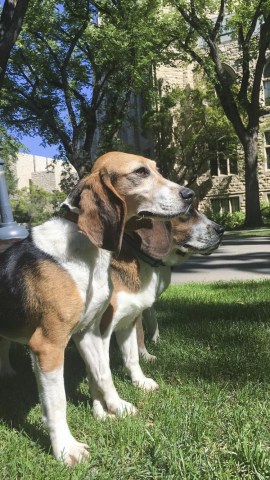
Student volunteers help by taking the research dogs for walks around the Bowl.
The Western College of Veterinary Medicine has been conducting research using groups of beagles as the subjects of the study. Not only are these subjects cute, cuddly and playful, but they also provide hands-on learning opportunities for undergraduate students.
The most recent batch of beagles, all nine named after Peanuts characters, were part of an ongoing pet-nutrition study conducted by Lynn Weber, a professor at the WCVM. The study is being conducted with waves of different groups of beagles and seeks to discover the health benefits of a pulse-based diet as opposed to a grain-based diet.
Although graduate students and PhD candidates have a more direct role in the research and experimental aspects of the study, Weber has sought assistance along the way from undergraduate students, who have had the opportunity to apply their learning in ways that are not typically offered by veterinary clinics.
“All of these are experiences they couldn’t get anywhere else,” Weber said. “In vet clinics, because of liability issues, you’re not allowed to interact with the animals as much as you might think. You might spend all of your time up front at the desk or in the back cleaning kennels.”
Undergraduate students are tasked with responsibilities such as walking the dogs, portioning out their food and providing general care such as grooming. Students also provide assistance to master’s students during research trials by collecting and examining data from non-invasive tests.
Fiona Moser, an alumna who recently completed the animal bioscience program at the U of S, had the opportunity to work with the dogs. Moser asserts that working directly with animals provides practical knowledge that is crucial to her field of study.

“Although it is important to learn the standard curricular material in school, gaining hands-on experience outside of the classroom is so important, especially when working with animals,” Moser said, in an email to the Sheaf. “I think learning how to properly handle and care for animals is a critical skill to have that ensures an animal’s welfare.”
While lectures, textbooks and assignments are valuable sources of information for students, Andrea Geiger, an alumna who recently completed the animal bioscience program, discusses how working with the beagles was a valuable way to get a practical hands-on experience in a clinical setting.
“While I previously had a general understanding of animal physiology, working with the beagles provided an opportunity for a more in-depth examination of how the different body systems work together on a whole-animal model,” Geiger said, in an email to the Sheaf.
Although the first batch of beagles has since been adopted, students will have the chance to work with a new group of dogs this spring. Moser hopes that this upcoming batch will provide more experiential-learning opportunities for students and that the widespread attention given to the beagles will encourage students to be active in and engaged with the research taking place on campus.
“I would encourage students in any program to seek out research going on at the U of S. Whether they participate or not, it is good to know about the research happening on campus,” Moser said. “In the end, students may fall in love with research and decide to pursue it as a career.”
—
Jessica Quan
Photo: Andrea Geiger / Supplied
Leave a Reply